
In the five years since University of Rochester Trustee Carol Karp ʼ74, Pʼ11 and Victor Glushko P’11 created the Carol and Sarah Karp Library Fellows Program, they have helped 19 students enhance their academic experience in River Campus Libraries and prepared them for their chosen careers.
And the 2023-2024 academic year was no different, welcoming six new students as the fellowship’s fourth cohort: Libby Braun, of Richmond, RI; Nixon (KiKi) Chege ’24 of Nairobi, Kenya; Kwame Edu-Ansah ‘24, of Ghana; Serenity Henlon ’24 from the Bronx; Ha Nguyen ’24 of Vietnam, and Liudmila Paymukhina ‘24, of Moscow, Russia.
“These are incredibly bright students with lots of ideas and the skills to influence their peers and their ‘home’ department,” said Kimberly Hoffman, assistant dean of Engaged Learning and Research. “They are leaders among their peers with influential power to elevate the state of an ever-evolving library system, and build a professional maturity based on real-world experience to advocate well into their desired careers.”
Carol Karp, chair of the University Libraries National Council, collaborated with her daughter Sarah ʼ11 to create the program to enhance students’ skills through experiential opportunities. The fellowship was designed for students to contribute to University of Rochester Libraries (URL), the University and broader community, while also becoming better prepared for their professional careers.
Fellows are assigned to specific URL units – such as iZone, Studio X, and Rare Books, Special Collections & Preservation – and take on projects that expand their knowledge base and skill set, while contributing to the libraries, the University, and the greater Rochester community.
Over its brief history, the fellowship has become one of the most beneficial student experiential learning opportunities on campus. And the fifth cohort of five fellows will start their Karp Fellowship in the fall.
“The Karp Fellows have added tremendous value and insight to the operations of the UR Libraries as well as into the Rochester community,” Hoffman added. “The students were real partners in many UR Libraries endeavors.”
The 2023-2024 Karp Fellows are:
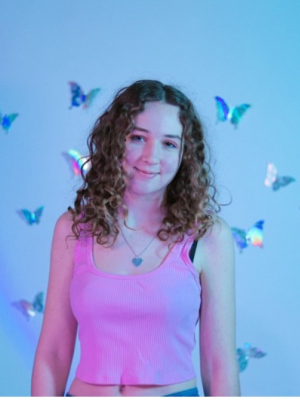
Libby Braun ’25 Studio X
Major: Digital Media Studies
Libby, 21, chose a project to help redesign Studio X’s old website and develop a tool to raise student awareness of Studio X.
“It was breaking down and wasn’t doing what we needed it to do,” she said. “I created a design layout on what the new website would look like and in the style of the University Libraries website.”
She started with a paper sketch of what the new pages could look like, and also took inventory of the website’s architecture – discovering where pages were situated on the website and determining if they’d be more accessible in other locations.
Libby also conducted stakeholder interviews with students, researchers, faculty, and administrators.
“From those interviews, I tried to identify any patterns and opportunities where Studio X can go next,” she said.
She also helped to develop a Studio X virtual reality game to educate users on virtual reality, teach users how to use the hardware (headset and controllers), and to learn about the Studio X space.
“My role was to do user testing,” she said. “We had six students who weren’t familiar with the technology come and try out to see what worked and what didn’t work, and then how we could apply that to our own game.”
“It was fun to see my designs in action,” Libby added. “There is more work to be done on the game and I would like to continue to work on it.”
What does the Karp Fellowship mean to you:
“The Karp Fellowship is a great learning opportunity,” she said. “I learned from my peers who had different projects and I wouldn’t normally have any awareness of their work. Seeing how passionate they were in their work just helped me find the passion for mine. I was the only junior, but it was great to work with all these wonderful upper classmen. They mentored me.”
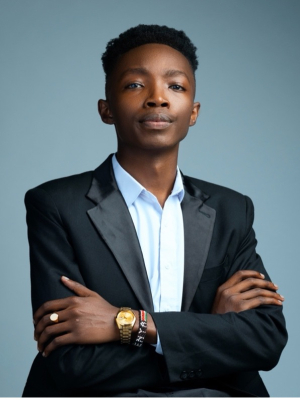
Nixon (KiKi) Chege ’24 iZone
Major: Finance
KiKi, 23, chose a project that sought to help optimize University alumni relations for iZone by reforming the advisory board, and coming up with a new alumni engagement platform.
“There was a huge disconnect for alumni who wanted to know what iZone was doing, so I figured, ‘Why not leave something behind that I can continue working on?’.”
KiKi got approval for his project from University administrators and researched how iZone engaged alumni in the past. By January he’d determined that iZone needed to pivot from a board of directors to an advisory board.
“I wasn’t very used to working with a step-by-step process,” he said. “but it brought me a deeper appreciation for policy and process. Ideally, you think the best direction is straight, but it’s different in reality.”
Although KiKi won’t be around to see how his proposal is implemented, he hopes a future Karp fellow will pick up the mantle.
“The person who takes this role after me should be a Karp fellow,” he said. “And, ideally, I’d love to be included in the effort. It’s a passion project for me. And it’s better when you love what you’re doing.”
What does the Karp Fellowship mean to you:
“It’s really an opportunity for deep thinking,” he said. “And it optimizes the possibilities of what people can contribute.”
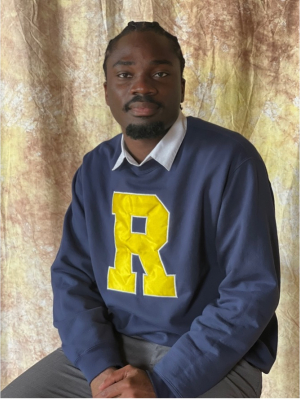
Kwame Edu-Ansah ‘24
Majors: Computer Science and English
Kwame, 22, chose a project to help create, organize, and maintain the Rochester Black Lives Matter (BLM) project.
“It’s a digital collection of still photographs from events from 2020 and 2021, that includes rallies, forums, and sermons from various community leaders,” he said.
Kwame also created, co-produced and co-edited contributions to Roc City Speaks, a video archive and art installment of interviews with Rochester residents about racial injustice.
“This one was focused on the students from UR on topics like affirmative action, voter rights, and the BLM movement,” he said. “Whenever I present it, it is received very well. When the archive is explained to people they want to be a part of it, add their voice to it and make sure their opinions on various issues are heard. The students are especially appreciative to have the opportunity to do this.”
The archive will live on through community engagements, such as a video presentation at the AME Memorial Zion Church last year.
What does the Karp Fellowship mean to you:
“It’s a wonderful initiative unlike anything I’ve been a part of in this school. It affords us the space, resources, and autonomy to take on these big projects. Also being surrounded by fellow Karp fellows from other parts of the library is very inspirational. They are all driven, and they become your support system. It’s invaluable.”
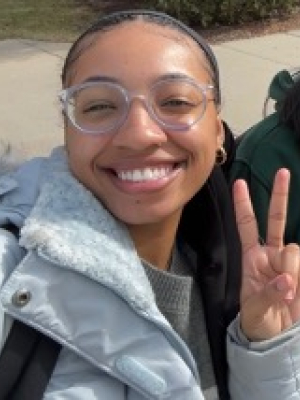
Serenity Henlon, ’24 iZone
Major: Public Health
Serenity, 21, worked with local high schools to enhance the mental health of local grade school students. She conducted field research to determine how to improve the mental health and educational outcomes of students affected by environmental factors such as poverty and violence.
Through a combination of individual questionnaires and three group discussions over a few months, Serenity built data sets.
“I was able to get a wide range of perspectives,” she said. “The students were very open. And that has to do with relatability. Growing up in the Bronx, I’ve seen the impact of poverty, gun violence and incarceration. And as a woman of color, I think that also broke down some boundaries.”
From these interviews and her data collection, Serenity designed a curriculum to address the environmental factors that adversely affect students’ mental health. Her curriculum was based on four modules section: 1) Understanding Mental Health, 2) Communication & Relationships, 3) Self-Care and Coping Strategies, and 4) Designing Goals and Resilience Building.
“They help tackle the reoccurring themes such as seeking help, peer support, being able to identify healthy versus unhealthy relationships, and a list of resources and organizations in the local area are all things applicable to mental health.”
While Serenity plans to continue her education in counseling psychology, she’ll use her gap year to reach out to the organizations she worked with on campus in hopes of applying her curriculum in the local schools.
What does the Karp Fellowship mean to you:
“It allows students to dive deeper into their passions,” she said. “It allowed me to find time to do research in the field I’m interested in and to get a foot in the door and helped inform what I want to do in the future.”
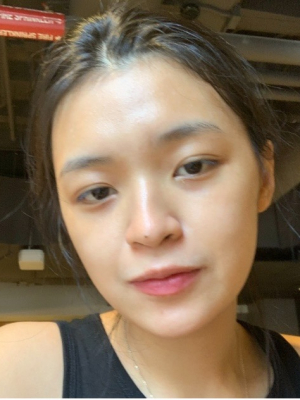
Ha Nguyen ’24 iZone
Majors: Political Science & Business Information Systems
Ha and iZone staff worked to assess the extent to which students have been left out of various regional collaborations and innovation processes – particularly relevant to the university’s areas of distinction in STEM. STEM was selected due to its prominence in iZone’s current strategic plan.
The first phase of Ha’s proposal for greater student-industry-policy collaborations saw the revamping of iZone’s CASC 161: Building Impactful Ideas course this past spring semester. The course taught students systems thinking to create ethical frameworks used in the creation of new Artificial Intelligence (AI)-driven healthcare applications that protect – rather than adversely affect – the rights and well-being of vulnerable populations.
In the course, students were assigned to groups responsible for educating local community partners on particular aspects of systems thinking, learned from and educated these partners about immediate systemic interventions. That work will continue through community-facing projects as early as Fall 2024.
From Ha’s work, CASC 161 students were able to:
- Establish a community of peers and subject matter experts who learned from each other to better frame market and policy challenges on the ethical use of AI in healthcare from a more inclusive and intergenerational perspective;
- Educate and train subject matter experts from the healthcare insurance, delivery, and innovation spaces, on how to integrate systems thinking methods into their work to solve problems in new and creative ways;
- Be exposed to previously unknown market and policy pain points in the identified challenge in a way that grew their network connections with subject matter experts for possible follow-on opportunities.
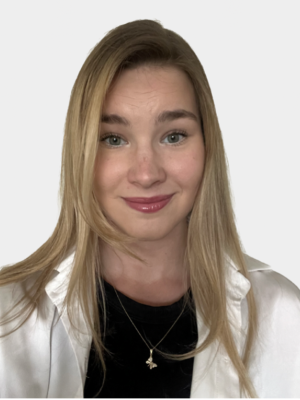
Liudmila Paymukhina ’24 Studio X
Majors: Computer Science and Psychology
Liudmila chose a virtual reality motion mapping project to help URMC Orthopedics Center patients regain their range of motion. An aspiring software engineer, she wrote a virtual game that uses motion sensor cameras to capture the full spectrum of patient movement.
“They explained their needs and their vision, and my contribution was creating the project,” she said. “It hasn’t been used by patients by the end of the semester, but I’m really hoping it’s something they’ll use in the near future. I plan to reach out to see how the project has gone because I’m curious what the future holds for this project.”
What does the Karp Fellowship mean to you:
“The fellowship is a great community of people and a great networking experience,” Liudmila said. “I used to work in Studio X as a (virtual reality) specialist, so it was great to have more flexibility to work on different projects.”


